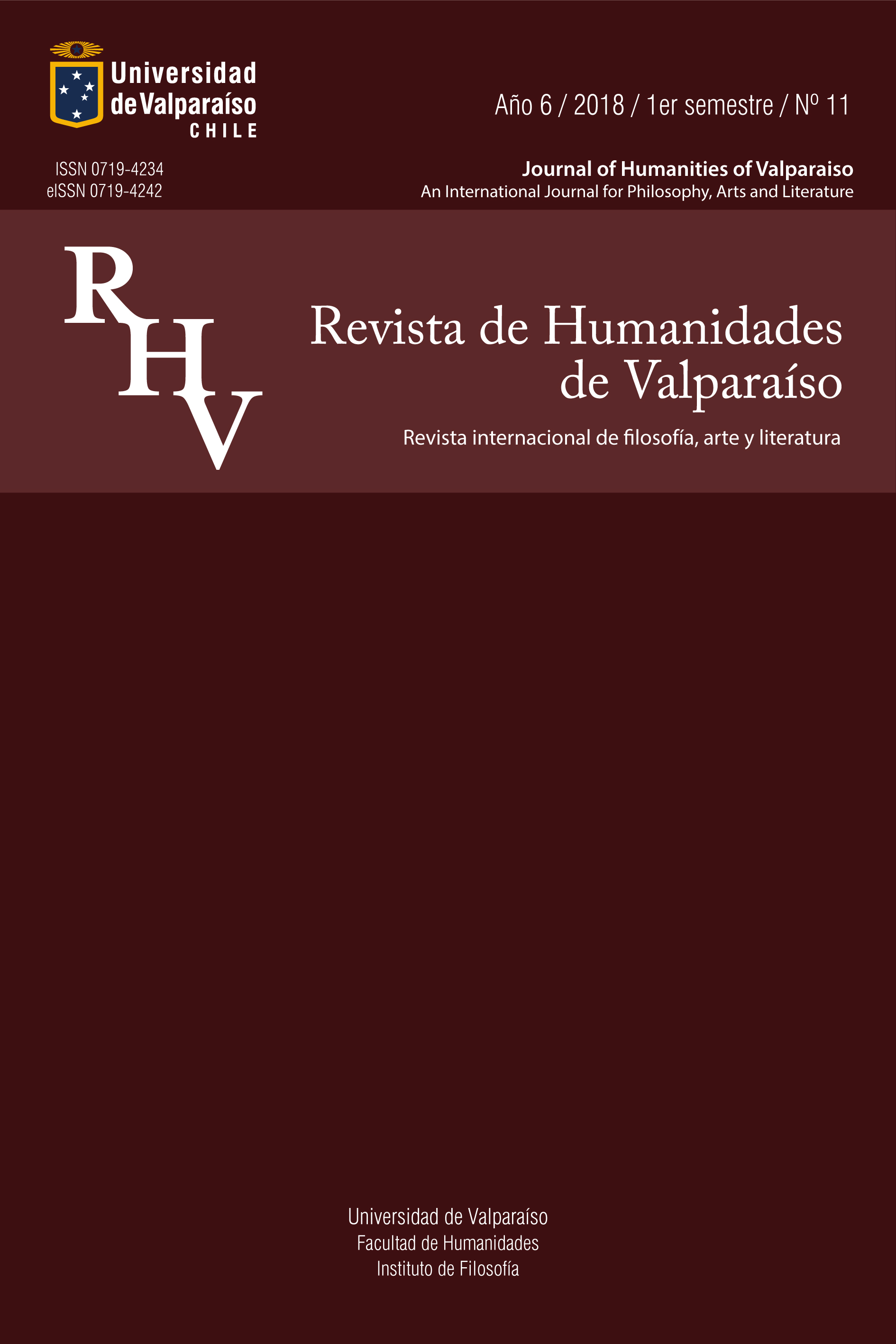Un posible acercamiento entre Ricoeur y Foucault: hermenéutica y prácticas del sí
DOI:
https://doi.org/10.22370/rhv2018iss11pp93-113Palabras clave:
Identidad, sujeto, hermenéutica, genealogía, metodologíaResumen
No es casualidad que la relación entre Paul Ricoeur y Michel Foucault haya empezado a desarrollarse en las investigaciones de quienes se han dedicado a uno u otro. Su pensamiento parece haberse desarrollado en universos filosóficos paralelos y, sin embargo, una lectura comparada aparece posible. Mostraremos las continuidades entre sus concepciones tomando como eje la identidad y el sujeto, así como la metodología con las que se abordan. Al recorrer sus obras posteriores a 1980, se hace evidente que cada uno a su manera enriquece la lectura que hacemos del otro.
Descargas
Referencias
Barthélémy, Annie (2010). “Herméneutiques croisées: Conversation imaginaire entre Ricoeur et Foucault”. En Études Ricoeuriennes / Ricoeur Studies, Vol 1, N°1: 55-67. Consulta 29 de septiembre de 2015, http://ricoeur.pitt.edu/ojs/index.php/ricoeur
Castonguay, Simon (2010). “Michel Foucault et Paul Ricoeur, vers un dialogue possible”. Études Ricoeuriennes / Ricoeur Studies, Vol 1, N°1: 68-86. Consulta 29 de septiembre de 2015, http://ricoeur.pitt.edu/ojs/index.php/ricoeur
Castro, Edgardo Manuel (2014). Introducción a Foucault. Buenos Aires: Siglo veintiuno editores.
Castro, Edgardo Manuel (2006). “Michel Foucault: sujeto e historia”. Tópicos [on line], n.14: pp. 171-183. Consulta 29 de septiembre de 2015, http://www.scielo.org.ar/scielo.php?pid=S1666-485X2006000100008&script=sci_arttext
Foucault, Michel (2001). La hermenéutica del sujeto: Curso en el Collège de France: 1981-1982. Buenos Aires: Fondo de Cultura Económica.
Foucault, Michel (1988). Nietzsche, la genealogía, la historia. Valencia: Pre-Textos.
Foucault, Michel (1984). “Le souci de la vérité (entretien avec F. Ewald)”. En Daniel Defert y François Ewald (dirs.), Michel Foucault. Dits et Écrits, tomo II. Paris: Gallimard.
Gonçalvez, Luis (2000). Metodología genealógica y arqueología de Michel Foucault en la investigación en psicología, ficha CEUP. Montevideo: Universidad de la República.
Gros, Frederic (2011). “Situación del curso”. En Michel Foucault, La hermenéutica del sujeto: Curso en el Collège de France: 1981-1982. Buenos Aires: Fondo de Cultura Económica.
Michel, Johann (2013). Ricoeur et ses contemporaines. Paris: PUF.
Potte-Bonneville, Mathieu (2010). Foucault. Paris: Ellipses.
Ricoeur, Paul (1986). Del texto a la acción. Buenos Aires: Fondo de cultura económica.
Ricoeur, Paul (1985). Temps et récit III. Paris: Éditions du seuil.
Ricoeur, Paul (1990). Sí mismo como otro. México D.F.: Siglo veintiuno editores.
Ricoeur, Paul (2000). La memoria, la historia, el olvido. Buenos Aires: Fondo de cultura económica.
Ricoeur, Paul (2005). Parcours de la reconnaissance. Paris: Gallimard.
Ricœur, Paul (1995). La critique et la conviction. Entretien avec François Azouvi et Marc de Launay. Paris: Calmann-Lévy.
Ricœur, Paul (1996). “Les paradoxes de l’identité”. L’information psychiatrique, 72, N°3: 201-206. Toulouse-Privat.
Vattimo, Gianni (1991). Ética de la interpretación. Buenos Aires: Paidós.
Descargas
Publicado
Número
Sección
Licencia
Aquellos autores/as que tengan publicaciones con esta revista, aceptan los términos siguientes:
- Los autores/as conservarán sus derechos de autor y garantizarán a la revista el derecho de primera publicación de su obra, el cual estará simultáneamente sujeto a la Licencia de reconocimiento de Creative Commons (CC BY-NC-ND 4.0 International) que permite a terceros compartir la obra siempre que se indique su autor y su primera publicación esta revista.
- Los autores/as podrán adoptar otros acuerdos de licencia no exclusiva de distribución de la versión de la obra publicada (p. ej.: depositarla en un archivo telemático institucional o publicarla en un volumen monográfico) siempre que se indique la publicación inicial en esta revista.
- Se permite y recomienda a los autores/as difundir su obra a través de Internet (p. ej.: en archivos telemáticos institucionales o en su página web) antes y durante el proceso de envío, lo cual puede producir intercambios interesantes y aumentar las citas de la obra publicada. (Véase El efecto del acceso abierto).






